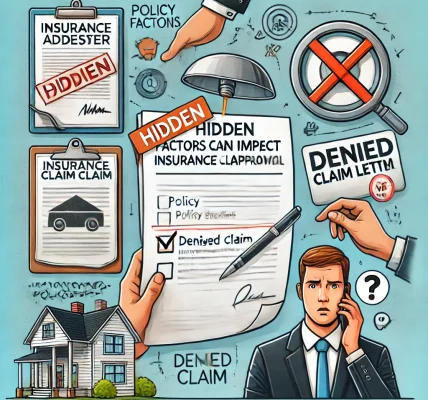Insurance is meant to provide financial security in times of need. However, many policyholders face frustration when their claims are denied. Understanding the common reasons for insurance claim rejections and knowing how to avoid them can save you time, money, and stress. In this comprehensive guide, we will break down the most frequent causes of claim denials and provide actionable steps to ensure a smoother claims process.
Why Do Insurance Claims Get Rejected?
Insurance companies deny claims for a variety of reasons, many of which can be avoided with proper knowledge and preparation. Some of the most common reasons include:
- Incomplete or Incorrect Documentation
- Filing After the Deadline
- Exclusions and Policy Limitations
- Non-Disclosure of Important Information
- Policy Lapses Due to Non-Payment
- Pre-Existing Conditions (for Health Insurance)
- Insufficient Proof of Loss or Damage
- Fraud or Misrepresentation
- Failure to Follow Claim Procedures
- Discrepancies Between Claim and Policy Coverage
By understanding these common reasons, you can take proactive steps to ensure your claim gets approved without unnecessary delays.
Step-by-Step Guide to Avoid Insurance Claim Rejection
Step 1: Understand Your Policy Thoroughly
Before purchasing an insurance policy or filing a claim, it is crucial to understand the following:
- What is covered and what is excluded?
- The maximum coverage amount
- The claim submission process
- The deadline for filing claims
Pro Tip: Read the fine print and ask your insurance provider for clarification on any unclear terms.
Step 2: Ensure Timely Premium Payments
A lapsed policy due to non-payment of premiums is a common reason for claim denial. To avoid this:
- Set up auto-payments to ensure premiums are paid on time.
- Keep track of payment due dates and maintain proof of payment.
- Check your policy renewal dates regularly.
Pro Tip: If you miss a payment, contact your insurer immediately to check if you can reinstate your policy.
Step 3: Provide Accurate and Complete Information
When buying an insurance policy or filing a claim, ensure all information is correct. This includes:
- Personal details (name, contact, address, etc.).
- Policy number and coverage details.
- Details of the incident leading to the claim.
Misrepresentation or hiding important facts can lead to claim rejection.
Pro Tip: If you realize you made an error in your application, notify your insurer immediately to correct it.
Step 4: File Your Claim Within the Deadline
Most insurance policies have a time limit for filing claims. If you fail to submit within the given period, your claim may be denied.
To prevent this:
- Report the claim as soon as possible.
- Keep track of deadlines mentioned in your policy.
- Submit a preliminary report even if you don’t have all the necessary documents.
Pro Tip: Set reminders for claim deadlines to avoid last-minute delays.
Step 5: Submit Complete and Correct Documentation
Lack of proper documentation is a major reason for claim denials. Depending on the type of insurance, you may need:
- Health Insurance: Medical reports, hospital bills, doctor’s prescriptions.
- Auto Insurance: Police report, photos of the accident, repair estimates.
- Home Insurance: Proof of property ownership, repair invoices, photos of damage.
Pro Tip: Keep both digital and physical copies of all important documents.
Step 6: Avoid Policy Violations
Insurance policies come with certain conditions. Violating these conditions can result in claim denial. Some examples include:
- Driving under the influence (for auto insurance).
- Engaging in illegal activities leading to loss or damage.
- Not maintaining your property, leading to avoidable damage.
Pro Tip: Always adhere to the terms and conditions of your insurance policy to avoid disputes.
Step 7: Keep a Record of All Communications
To ensure a smooth claims process:
- Save emails and letters exchanged with the insurance company.
- Take notes during phone calls and get names of customer service representatives.
- Keep a file with all claim-related documents.
Pro Tip: If there are delays, follow up professionally and ask for an estimated resolution timeline.
Step 8: Provide Clear and Substantial Proof
One of the main reasons for claim denials is insufficient proof of loss or damage.
To strengthen your claim:
- Take high-quality photos or videos of the incident.
- Obtain witness statements if applicable.
- Keep receipts of repairs or medical treatments.
Pro Tip: In case of theft, file a police report immediately and submit it to your insurer.
Step 9: Check for Policy Exclusions
Many claims get rejected because the loss is not covered under the policy. To avoid this:
- Check the policy’s exclusion section before filing a claim.
- If an exclusion applies, explore alternative coverage options.
Pro Tip: If needed, consult an insurance expert to understand the fine print better.
Step 10: Appeal If Your Claim Is Denied
If your claim is rejected, you have the right to challenge the decision. Here’s how:
- Request a written explanation from the insurer.
- Review your policy to verify if the denial is justified.
- Provide additional documents to support your case.
- If necessary, escalate the issue to an insurance ombudsman or legal expert.
Pro Tip: Stay calm and professional while negotiating for claim approval.
Final Thoughts
Filing an insurance claim can be a complex process, but being informed and prepared can significantly increase your chances of approval. By understanding common reasons for rejection and following the right steps, you can safeguard yourself from unexpected financial burdens.
Key Takeaways:
✅ Read and understand your policy thoroughly. ✅ Make timely premium payments to keep your policy active. ✅ Provide accurate and complete information. ✅ File claims within the stipulated deadline. ✅ Submit all required documents properly. ✅ Follow up professionally if there are delays. ✅ Know your rights and appeal if your claim is unfairly denied.




